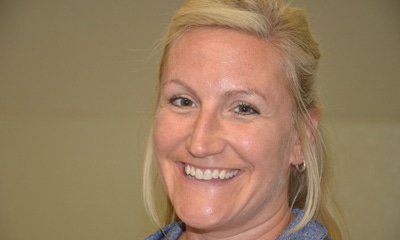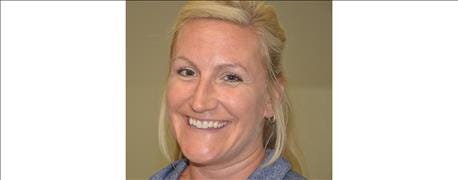
Amy Sims is one of those people who would rather talk about soil and water conservation than sleep or eat. If she can find an audience of one or a hundred, her passion spills over as she begins talking about soil conservation and Indiana’s soil conservation partnership.
Sims is a resource conservationist employed by the Division of Soil Conservation, part of the Indiana State Department of Agriculture. She is assigned to Perry, Spencer and Warrick counties in southwest Indiana. While that may be her job, her passion is doing all she can to work with others to get conservation practices on the land.
Here is a brief interview between Indiana Prairie Farmer and Sims.

PASSION FOR CONSERVATION: Give Amy Sims an audience and she can’t wait to tell people how passionate she is about soil and water conservation in Indiana.
IPF: What do you do in your position?
Sims: I help do surveys for conservation practices that landowners are putting on their land. Some of these practices are partially funded with cost-share. We work on some practices which are part of EQIP [Environmental Quality Incentives Program] contracts. This program is offered by the Natural Resources Conservation Service.
IPF: Are EQIP practices the only ones you do survey work for?
Sims: No. Many farmers sign up for practices through the continuous Conservation Reserve Program. These practices include grass waterways, filter strips and many others. There is also cost-share available for these practices. Farmers and landowners can visit with NRCS staff to explore possibilities and what fits their needs best. Then they can make an application and pursue cost-share funding through the Farm Service Agency.
IPF: What do you do as a state employee?
Sims: Besides survey work on projects, I help with the cornstalk nitrate sampling project with the INfield Advantage program. I’m in charge of the reclaimed mine group, and I also assist with most Clean Water Indiana grants. All three of the counties where I work have Clean Water Indiana grants.
IPF: So why are you working on the two-stage ditch project in Spencer County when it also may involve federal cost-share dollars?
Sims: That’s the beauty of what we do here in Indiana. We all work together. The Indiana Conservation Partnership makes all of us stronger. Many groups are involved in the partnership, including NRCS, ISDA, soil and water conservation districts and Purdue University Extension.
IPF: So when you go out to survey for a practice, are you working alone?
Sims: We usually work with someone else. It might be a specialist with NRCS or it might be an employee with a soil and water conservation district. Many districts employ technicians. They are on the local staff and are also trained in how to survey and design plans for various soil conservation practices. Who is working side by side and who employs them may vary from day to day. The beauty of the conservation partnership is that we all work together to get the job done.
IPF: Do you do survey work the old-fashioned way, or do you have access to ATVs equipped with GPS and survey equipment?
Sims: We can do it either way. If an ATV equipped for this purpose is available in our area, we typically use it. NRCS has several of those units around the state. If a job needs to be done and one isn’t available, we can do it on foot without that equipment. It works well because we all share and want to work together to get the job done.
IPF: How would you sum up the conservation effort in Indiana?
Sims: It’s all about a partnership. There are many projects going on all over to improve the land and protect water quality. I am involved in several projects in southwest Indiana alone which I wish you could see. We work together to get the job done.
About the Author(s)
You May Also Like




